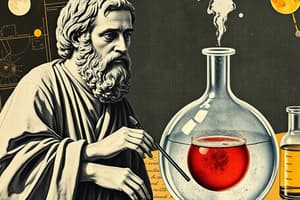Podcast
Questions and Answers
What is the primary purpose of the method Socratic?
What is the primary purpose of the method Socratic?
- To challenge assumptions and clarify meaning (correct)
- To facilitate respectful arguments
- To gather historical evidence
- To verify scientific observations
Which philosopher is known for coining the term 'philosopher'?
Which philosopher is known for coining the term 'philosopher'?
- Socrates
- Pythagoras (correct)
- Aristotle
- Heraclitus
What does the Greek term 'Elenchus' refer to in the context of inquiry?
What does the Greek term 'Elenchus' refer to in the context of inquiry?
- To experiment scientifically
- To inquire or investigate (correct)
- To analyze historical records
- To engage in respectful discourse
How does the dialectic method facilitate discussion?
How does the dialectic method facilitate discussion?
What is the significance of 'speculation' in the context of participation in the world?
What is the significance of 'speculation' in the context of participation in the world?
Which philosopher asserted that 'no man ever steps in the same river twice'?
Which philosopher asserted that 'no man ever steps in the same river twice'?
What does critical thinking primarily involve?
What does critical thinking primarily involve?
What does the value of truth pertain to?
What does the value of truth pertain to?
Who is referred to as the 'laughing philosopher'?
Who is referred to as the 'laughing philosopher'?
Which branch of philosophy is concerned with the study of rightness or wrongness of human conduct?
Which branch of philosophy is concerned with the study of rightness or wrongness of human conduct?
Which philosopher is known as the teacher of Plato?
Which philosopher is known as the teacher of Plato?
What does 'axiology' study?
What does 'axiology' study?
Who stated that everything is water?
Who stated that everything is water?
Which philosopher is known as the student of Socrates?
Which philosopher is known as the student of Socrates?
What does the term 'metaphysics' refer to?
What does the term 'metaphysics' refer to?
Which branch of philosophy deals with fundamental issues concerning knowledge?
Which branch of philosophy deals with fundamental issues concerning knowledge?
Study Notes
Notable Philosophers
- Democritus, known as the 'laughing philosopher'
- Diogenes of Sinope, recognized as the 'craziest philosopher'
- Epicurus, the Father of Epicureanism
- Socrates, teacher of Plato; emphasizes living a virtuous life for happiness
- Plato, student of Socrates and teacher of Aristotle; posits that reality is invincible
- Aristotle, student of Plato and teacher of Alexander the Great; believed inquiry stems from wonder
- Thales of Miletus, claimed that everything is water
- Pythagoras, first to call himself a 'philosopher'; coined the term for the pursuit of wisdom
- Heraclitus, asserted that permanence is an illusion; "no man ever steps in the same river twice"
Branches of Philosophy
- Metaphysics: Pursuit of understanding reality
- Ethics: Study of rightness and wrongness in human conduct
- Epistemology: Examination of knowledge and its fundamental issues
- Logic: Originates from the Greek word 'logos;' pertains to reasoning and discourse
- Aesthetics: Exploration of beauty
- Axiology: Study of goodness or virtue
Methods of Philosophizing
- Socratic Method: Inquiry through questioning to explore ideas and challenge assumptions
- Dialectic Method: Discussion-based method for deriving answers through logical discourse
- Scientific Method: Experimental approach for observation and answering questions
- Historical Method: Gathering evidence and formulating ideas about the past
Concepts and Terms
- Abundance: Latin term meaning "to overflow nonstop"; relates to overflowing resources
- Specula/Speculation: Engaging with the world based on experiences to generate ideas
- Critical Thinking: Analysis and judgment of information and assumptions
- Reflection: Examining experiences to understand implications of actions and events
Values of Truth
- Truth: Objective reality of statements or propositions; reflects the actual state of affairs
- Theories of Truth: Various philosophical interpretations of truth's nature and implications
Historical Context
- Greek philosophy flourished notably during the second historical period, starting in the Ionic colonies around the 6th century BC.
Studying That Suits You
Use AI to generate personalized quizzes and flashcards to suit your learning preferences.
Related Documents
Description
This quiz explores the philosophies of notable thinkers such as Democritus, Diogenes of Sinope, and Epicurus. From the laughter of Democritus to the cynicism of Diogenes, and the principles of Epicureanism, delve into the ideas that have shaped philosophical thought. Test your knowledge and understanding of these influential philosophers.




